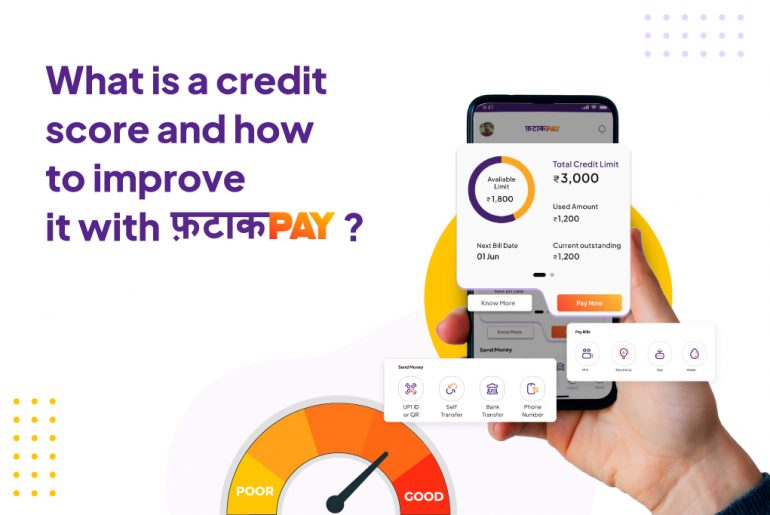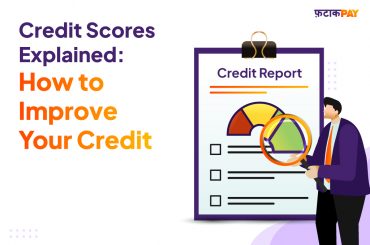In the world of “buy now, pay later”, it is essential to keep an eye on one’s credit score. Although understanding credit score is simple, it can be scary to see a lower credit score. This article talks about what a credit score is and how you can improve it.
What is a Credit score?
A person’s creditworthiness, or capacity to pay back debt, is determined by their credit score or credit rating. Typically, it is expressed as a number based on the individual’s credit history and payback records across various loans and credit institutions. The credit score of an individual can determine things like the chances of their loan approval, interest rates for future loans, and better repayment options.
Four credit information businesses in India have Reserve Bank of India approval. These include Credit Information Bureau (India) Limited (CIBIL), Experian, Equifax, and Highmark.
The CIBIL rating is the widely accepted credit score in India. It is a three-digit figure, the CIBIL credit score goes from 300 to 900, with 900 being an excellent score.
What is a good credit score and why is it important?
A CIBIL credit score of 750 or more is regarded to be the best. To be more specific one can keep the following CIBIL score range in mind.
| Range | Meaning |
| NA/NH | This denotes it is “not applicable” or “no history”. |
| 350-549 | CIBIL scores in this range are regarded to be poor. It might be difficult to find a loan or a credit card in this range. |
| 550-649 | CIBIL scores in this range are considered to be fair. The interest rates for a score in this range would be higher. |
| 650-749 | CIBIL scores in this range are considered to be good. An individual having a credit score in this range would not have the negotiating power to leverage the best deal for loans. |
| 750-900 | CIBIL scores in this range are considered to be excellent. This range of credit score is considered to have the lowest rate of defaulters, hence banks provide loans and credits at the lowest rates. |
Having a higher credit score is very important as it brings the following benefits:
- Get the best credit card available that comes equipped with lots of features and offers.
- Faster Loan Approval – With a good credit score, loan applications will be swiftly and easily approved by banks.
- Better Interest Rate – An individual with a high credit score can negotiate to reduce the interest rate on credit cards and loans.
- Loans are made more affordable – Processing fees and numerous other expenses are attached to loans.
How can you build your credit score?
- Get organized and pay obligations on time
An individual should be regular in repayment of debt and paying obligations on or before time. Establishing a credit discipline by setting reminders for all payments will help you in the long run. The calculation of credit score will be significantly impacted by how unpaid debt is handled. In addition to paying a penalty for late EMI payments, it will also hurt the credit rating. Therefore, it would be helpful to build up a high CIBIL score if all credit payments are on time. Use a service that enables automated bill payment to avoid worrying about missing due dates.
2. Use credit prudently
Applying for several loans at once would indicate that the applicant is trapped in an unforgiving cycle due to a lack of money. Use credit responsibly by not taking on much debt at once. Only apply for a minimal number of loans in a given time frame. It would be advisable to repay one debt before taking out another as it would prevent credit score from plummeting.
3. Maintain a healthy credit mix
To increase credit score, it is best to have a balanced portfolio of secured (such as a mortgage or car loan) and unsecured (such as a personal loan or credit card) loans with both long and short terms. A surplus of unsecured debt could be perceived unfavorably.
4. Keeping check of the borrowed credit
Applying for fresh credit should only be done if it is needed and having the means to pay it back. Credit score will be impacted by having too much debt. Borrowing beyond the limit should be avoided as it can not only lead to unnecessary penalties and interest charges but also a decrease in credit limit and credit score.
5. Correction of errors on the credit report
Checking CIBIL score and report frequently for any discrepancies or incorrect information may occasionally be added to your report by CIBIL, and details may take longer to enter while amending your records. Possible errors such as a loan that has been paid off haven’t been updated on the credit record, credit activity that intermingled with someone else’s, or unfavorable information that is too old to be included can only be detrimental to the user. Once these inaccuracies have been located, correcting those mistakes will improve the credit rating.
6. Create a solid history over time
Debt is frequently necessary. However, the goal is to borrow the appropriate amount of money, manage it wisely, and repay it on time. When taking out a loan, one could choose a lengthier term to keep their EMI low. Additionally, this could raise the credit limit. The key to raising the credit score is to have a lot more credit and keep its utilization rate low. This can gradually increase the credit score, which will enable the user to qualify for quick and affordable loans.
How can FatakPay help improve credit scores?
Only 4% of Indians have access to credit facilities; for the great majority, credit facilities remain inaccessible. FatakPay is developed to bridge this gap and make financial wellness accessible to everyone. Fatakpay helps users increase their credit score in the following ways:
- Availability of credit to users with no credit history
FatakPay has made it easier to provide credit facilities to users with no credit history. Quick and paperless registration can help users build their credit scores from scratch. FatakkPay has no interest in its credit facilities, which does not burden users.
2. Minimal borrowing limit
FatakPay provides a nominal borrowing limit of Rupees 10,000 to new users. The ceiling limit is then increased based on how well the user manages unpaid debt. The borrowed amount can then be repaid with ease on time which prevents credit rating to drop.
3. Easy repayment options
FatakPay helps the user improve their credit score by providing customizable billing cycles. Easier repayment options include UPI Mandate, E-Nach, and repaying the credit bill at their convenience and availability of money. This can help the user make timely payments and not miss out on their credit card bills.
4. Regular transaction statements
FatakPay allows users to keep track of their payments by providing monthly transaction statements. This helps the user check their credit history and analyze their spending and credit habits.
5. Paperless Trail
FatakPay is 100% digital. This prevents any errors and inaccuracies in credit reports and transaction statements which can reduce the users credit score. A credit score is essential to all users who wish to avail of credit facilities and loans. Having a high credit score can help avail loans easily at lower interest rates. FatakPay provides credit facilities at 0% interest rates which makes it easier for the user to improve their credit rating gradually.







